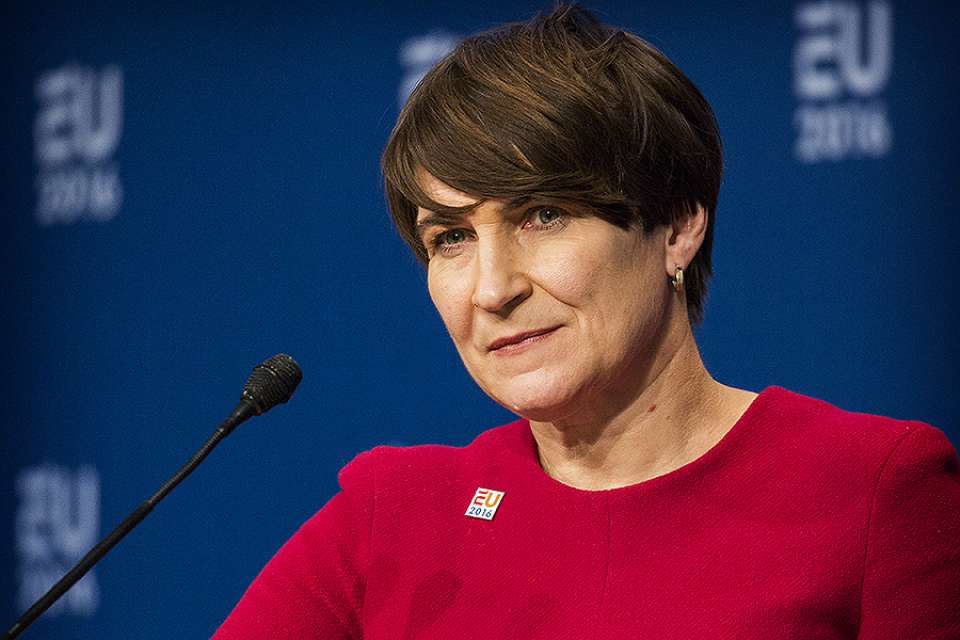The conferral of the Vatican’s Order of St. Gregory the Great to Dutch politician and pro-abortion activist Liliane Ploumen was part of an ordinary diplomatic exchange of honorific titles, and does not mean that the Vatican supports Ploumen’s abortion campaigns, a Vatican spokesperson explained Jan. 15.
Responding to requests of clarification, Paloma Garcia-Ovejero, deputy director of the Holy See Press Office, said that “the honorific of the St. Gregory the Great Pontifical Order that Liliane Ploumen, then Minister for Development received in June 2017, during the visit of the Dutch Royals to the Holy Father, is part of the diplomatic praxis of the exchange of decorations among delegations during official visits between heads of state and government to the Vatican.”
Garcia-Ovejero said that the decoration “cannot be by any way considered an endorsement to the pro-abortion and birth control politics advocated by Mrs. Ploumen.”
Liliane Ploumen, a Dutch politician, served as Dutch Minister for Foreign Trade and Development Cooperation from Nov. 5, 2012 to Oct. 26, 2017.
In that capacity, she was part of a delegation of the Dutch monarchy that visited Pope Francis on June 22.
On that occasion, the Vatican returned the Dutch Royal Family a stick belonging to William I, Prince of Orange, that had previously been lost in the Jesuit Catalan archives.
The stick — in fact a scepter — depicts the coat of arms of William of Orange. The stick was used by Louis of Nassau, the brother of William of Orange, during the 1574 Mookerheyde battle in 1574. It was lost, came into the hand of a Spanish general and eventually the superior of the Jesuits. Eventually, it got lost in the Catalan archives.
The occasion included an exchange of honorary titles, an element of diplomatic praxis that usually grabs no headlines.
Diplomatic visits to the Vatican are highly choreographed affairs.
During an official state visit to the Vatican, the most solemn kind of diplomatic meeting, protocol dictates that a solemn procession from St. Peter’s Square, into the Vatican, to the Cortile San Damaso, which accesses the Apostolic Palace.
The procession is greeted by three blasts of trumpets, and then the delegation enters the Apostolic Palace and walks through the rooms.
There is even a specific protocol for walking through Apostolic Palace. The procession toward the Papal Library, where the meeting takes place, is led by a Swiss Guard sergeant, followed by 6 Sediari Pontifici, ceremonial servants, in the case of head of state and 8 Sediari Pontifici for monarchs.
These details explain that a royal family enjoys a sort of “right of precedence” in Vatican protocol, and for that reason the visit of a Royal Family is a serious and solemn event.
The visit of the King William Alexander and Queen Maxima was not an official state visit, but a mere audience, and so an exchange of honorifics would not ordinarily to take place. However, the presence of the royal family, and the solemnity of returning of the Dutch stick, might have suggested to the Secretariat of State a protocol designed to highlight the audience, including the conferral of honors, a Vatican source explained to CNA.
In some cases, the Vatican can ask not to proceed with an exchange of awards or honors, especially when some of the members of the other delegations can be controversial, a source close to the Vatican diplomatic service told CNA Jan. 15.
However, the exchange of decorations took place during the Dutch visit.
The presence of Ploumen in the Dutch delegation has sparked controversies because she is an abortion advocate.
In 2017, Ploumen launched an international campaign to support abortion, designed to counter the Trump administration’s decision to cut off funds for NGOs that facilitate abortion. Ploumen’s organization, named “She Decides,” collected nearly $400 million.
However, news of her award did not grab any headlines until Ploumen herself showed off the medal in a recent interview to the Dutch television BNR.
In the interview, the Dutch politician presented the decoration as a personal award, and said that while her the pro-abortion campaign “was not mentioned” as the reason for the decoration, but, she said, “the Vatican knows that I founded ‘She decides’, but this did not prevent them from awarding me.”
“It is interesting,” she added.
The honorific was apparently given without significant previous consultation. In a statement released Jan. 15, Cardinal Wilhelm Ejik, Archbishop of Utrecht and Primate of the Netherlands, stressed that he “was not involved” in the process that decided “to give the decoration of Commander of the Pontifical Equestrian Order St. Gregory the Great, which the former minister Ploumen received last year.”
Cardinal Ejik said that he had not initially been aware that the decoration had been given to the minister.
Established in 1831, the Equestrian Order of St. Gregory the Great is one of the five orders of knighthood of the Holy See, and can be bestowed to Catholic men and women, but also — in rare cases — to non Catholics. The honor is a recognition of personal service to the Holy See and to the Church.

